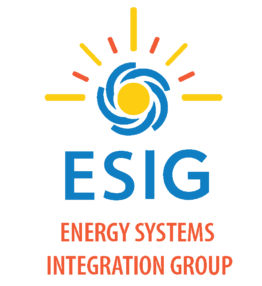HISTORY
The Energy Systems Integration Group (ESIG), previously known as the Utility Wind Integration Group (UWIG), was established in 1989 to provide a forum for the critical analysis of wind for utility applications. Initially focused on wind power, UWIG expanded its focus to include solar power and distributed generation and become known as the Utility Variable-Generation Integration Group in 2011. In 2018, driven by the economics and growth of renewable energy and the interdependent nature of the global energy industry, the association expanded its focus beyond the electricity system of today. These expanding perspectives around energy, and the growing need for coordination across the ways that we produce, convert, deliver and use energy, are the reasons we have become the Energy Systems Integration Group (ESIG). This new positioning fulfills ESIG’s commitment to create a vibrant, compelling, and sustainable professional association that provides our members with the timely sharing and distribution of information, research, analysis, operations knowledge and peer-to-peer networking required by the changing global energy industry and the future industry landscape. ESIG does this by providing:
- Collaborative thought leadership at the forefront of energy systems integration and operations.
- Technically-grounded information and education without lobbying, selling or advocating.
- Timely review and distribution of research on emerging technologies and practices.
- Solutions that maximize asset utilization and optimize profits.
OUR MISSION
ESIG is a non-profit organization that galvanizes the expertise of the technical community to support grid transformation and energy systems integration. ESIG does this by serving as a trusted and objective convener of the engineering and technical community, providing information, education and peer-to-peer networking to support total energy systems integration and operations. ESIG accomplishes this through the collaborative efforts of our members—grid and market operators, utilities, power producers and energy operators, system and component manufacturers, government laboratories, universities, consulting firms, forecasters, developers and other energy organizations.
WORKING GROUPS
Through our technical working groups, ESIG members are provided access to credible information on the status of energy systems integration technology and deployment.
- Technical Workshops and Special Topical Workshops – Technical workshops offer panel presentations on the latest studies, experiences and information. Designed to provide timely and broad updates on the most important issues, they are complemented by special topical workshops focused on areas that require in-depth presentations and interactive discussions.
- Technical Working Groups – working group meetings provide a less formal forum for developing emerging topics. At this time, five technical working groups are operating, each focused on specific areas of interest to its members:
- Reliability Working Group
- System Operation and Market Design Working Group
- Distributed Energy Resources (DER) Working Group
- System Planning Working Group
- Research and Education Working Group
O&M USERS GROUP
The Operations & Maintenance Users Group offers turbine and solar-specific O&M discussion roundtables where owners/operators of these assets can share and discuss experiences. This group has special membership rules and protocols so that operating facilities members can speak frankly and share sensitive information in a safe environment.
